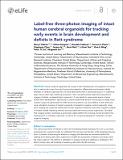Label-free three-photon imaging of intact human cerebral organoids for tracking early events in brain development and deficits in Rett syndrome
Author(s)
Yildirim, Murat; Delepine, Chloe; Feldman, Danielle; Pham, Vincent A; Chou, Stephanie; Ip, Jacque; Nott, Alexi; Tsai, Li-Huei; Ming, Guo-Li; So, Peter TC; Sur, Mriganka; ... Show more Show less
DownloadPublished version (7.442Mb)
Publisher with Creative Commons License
Publisher with Creative Commons License
Creative Commons Attribution
Terms of use
Metadata
Show full item recordAbstract
<jats:p>Human cerebral organoids are unique in their development of progenitor-rich zones akin to ventricular zones from which neuronal progenitors differentiate and migrate radially. Analyses of cerebral organoids thus far have been performed in sectioned tissue or in superficial layers due to their high scattering properties. Here, we demonstrate label-free three-photon imaging of whole, uncleared intact organoids (~2 mm depth) to assess early events of early human brain development. Optimizing a custom-made three-photon microscope to image intact cerebral organoids generated from Rett Syndrome patients, we show defects in the ventricular zone volumetric structure of mutant organoids compared to isogenic control organoids. Long-term imaging live organoids reveals that shorter migration distances and slower migration speeds of mutant radially migrating neurons are associated with more tortuous trajectories. Our label-free imaging system constitutes a particularly useful platform for tracking normal and abnormal development in individual organoids, as well as for screening therapeutic molecules via intact organoid imaging.</jats:p>
Date issued
2022Department
Massachusetts Institute of Technology. Department of Brain and Cognitive SciencesJournal
eLife
Publisher
eLife Sciences Publications, Ltd
Citation
Yildirim, Murat, Delepine, Chloe, Feldman, Danielle, Pham, Vincent A, Chou, Stephanie et al. 2022. "Label-free three-photon imaging of intact human cerebral organoids for tracking early events in brain development and deficits in Rett syndrome." eLife, 11.
Version: Final published version